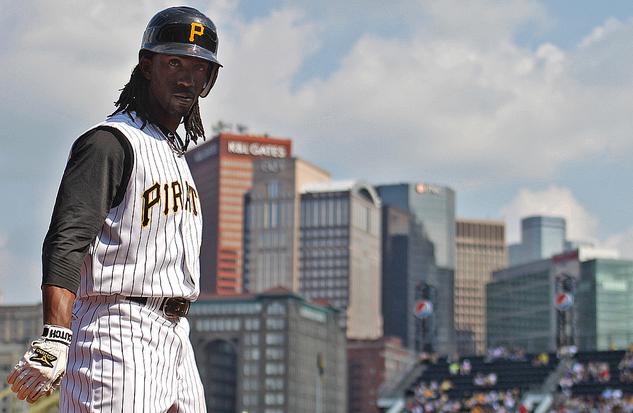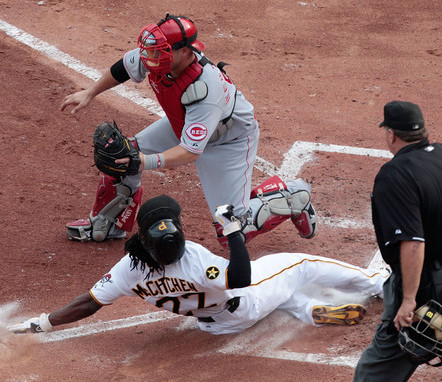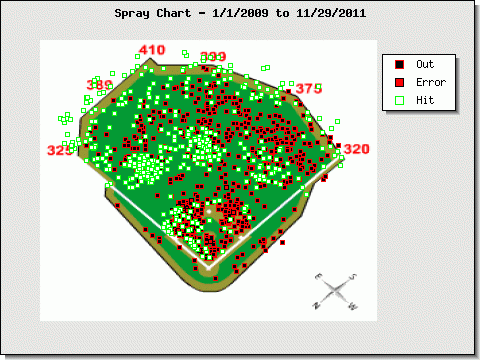
The Yankees have focused on improving their starting rotation this offseason and rightfully so. Even with Freddy Garcia back in the fold, they still stand to open the season with no fewer than two question marks in the rotation, and it’s really more like four question marks behind undisputed ace CC Sabathia. Just because the rotation needs help doesn’t mean the rest of the team gets ignored though, and just because the offense is a strength doesn’t mean it can’t be further improved.
Earlier this week, it was reported that the Pirates are open to listening to trade offers for center fielder Andrew McCutchen, a report the team unsurprisingly denied a few hours later. The two sides discussed about a long-term contract extension earlier this year, though talks slowed during the summer and there haven’t been any reports of progress lately. A player of McCutchen’s caliber fits on pretty much every team, regardless of who they already have in the outfield. Rather than do the usual Pros & Cons shtick, I’m going to break his game down into the three basic parts of baseball: offense, defense, and baserunning. Let’s start with the bat…
Offense
Since breaking into the league in June of 2009, McCutchen has consistently produced about 25% better than league average with the bat. In fact, his wRC+’s by year from 2009-2011 are 125, 125, and 129. It all starts with his approach at the plate. McCutchen works deep counts, having seen 4.18 pitches per plate appearance this past season (12th highest in baseball) and 4.10 for his career. That’s Kevin Youkilis (4.18 in 2011) and Nick Swisher (4.07) territory. Those deep counts lead to a lot of walks — including 13.1% this past season (16th highest in baseball, right behind Youkilis) and 11.7% for his career — but surprisingly not many strikeouts, just 18.6% this year and 16.3% for his career.
McCutchen started to hit more line drives and fly balls this past season, resulting in more power (.198 ISO and 23 homers) but a slightly lower BABIP (.291 after .318 from 2009-2010). After hitting .286 in each of his first two seasons, his average dropped to .259 in 2011 thanks to a late-season slump (.196/.321/.384 in his final 35 games). Like most hitters, he does most of his damage to the pull side, but he can drive the ball with authority to right and right-center. Here’s proof. His spray chart show plenty of balls driven right to the wall to all fields throughout his career…
(via Texas Leaguers)
McCutchen does show a bit of a platoon split, but it’s nothing crazy. He’s posted a .397 wOBA with a .231 ISO against left-handers in his career, but against right-handers those numbers are .347 and .166, respectively. That’s not a major red flag because the performance against same-side pitcher is still above-average. At this point in time right now, McCutchen is a legitimate .275/.365/.450 hitter (.277/.368/.455 career), a level of performance roughly 25 others have been able to maintain over the last three seasons.
Defense
McCutchen is a great example of how flawed defensive metrics still are. They’ve gotten better, but none of them are perfect. All the systems rated him as well below average from 2009-2010, including UZR (-15.0), DRS (-18), Total Zone (-5), and FRAA (-23.7), but they all changed gears and considered him above-average in 2011 (+3.5, +7, +9, and +9.6 respectively). The improvement had nothing to do with McCutchen himself, he’s still the same defensive player he always was. The improvement came from the team’s manager.
Under former skipper John Russell, the Pirates’ outfield used to play what was best described as a no-triples alignment. They played deep with the left and center fielders shaded towards the left-center field gap, the big part of PNC Park. Matt Bandi spent quite a bit of time looking at the club’s outfield alignments at the now-defunct Pittsburgh Lumber Co. Russell was fired last offseason and replaced with Clint Hurdle, who had his outfielders play at more traditional depths and positions.
McCutchen’s defense wasn’t the problem, the metrics were just unable to properly measure his contributions in the no-triples alignment. Baseball America (subs. req’d) said he was a “a potential Gold Glover” with “outstanding instincts and an average arm in center field” before the 2009 season, the last time McCutchen was prospect-eligible. I suspect the advanced metrics will match up with that scouting report in the coming years, as the sample size continues to grow.
Baserunning

Although he’s stolen at least 22 bases in his three seasons, including 33 in 2010, McCutchen isn’t the most efficient baserunner. He’s been thrown out exactly ten times each of the last two seasons (56-for-76), a 73.7% success rate that is above the break-even point but not exactly stellar. His 75.0% success rate in the minors suggests he might not get much better than he is right now.
Stolen bases are just part of the baserunning equation though. McCutchen has been able to take the extra base 40% of the time his career, which is essentially the same as the 41% league average. Baseball Prospectus’ baserunning stats say he was a bit below-average at advancing on ground balls, sacrifice flies, and on wild pitches/passed balls this past season, but he was above-average in 2010 and 2009 as well. Either McCutchen suddenly forgot how to run the bases in those situations in 2011, or the data is imperfect. I tend to believe the latter is true.
Smash it all together — stealing bases, taking the extra base on hits, moving up on other balls in play/wild pitches/passed balls — and McCutchen is essentially a league average baserunner. For what it’s worth, FanGraphs’ catch-all baserunning data says he’s been a touch better than average in each of his three seasons. If you’re going to be bad at something, baserunning is a good thing to be bad at.
* * *
Just a few weeks after his 25th birthday, McCutchen is already a true franchise player, a guy that impacts the game on both sides of the ball while playing a premium up-the-middle position. He’s never been on the disabled list, not even in the minors, and thanks to some service time shenanigans he won’t be eligible for arbitration until next season and won’t be eligible for free agency until after the 2015 season. That’s four full years of team control left.
A near six-win player in the eyes of both both fWAR (5.7) and bWAR (5.5) this past season, there are few players in the game with more trade value than McCutchen. Obviously, any team hoping to trade for him would need to really blow the Pirates out of the water. A trade involving a star player in his pre-arbitration years is unprecedented, so we don’t have any kind of reference for what a potential trade package would look like. I imagine any teams that call Pittsburgh would start negotiations by opening up their farm system and saying “okay, pick any four.”
Please understand that I’ve set you (and myself) up for extreme disappointment. It’s highly unlikely that the Yankees or any other team will be able to pry McCutchen away from Pittsburgh this offseason, just like no one was able to pry The Justin Upton away from the Diamondbacks last winter despite his reported availability. But man, if the Pirates are sincerely willing to listen the offers … the Yankees should be all over this. Acquiring McCutchen is both a win-now and win-later move.
